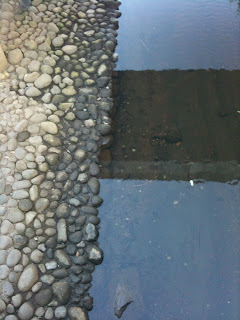




The week since last Saturday has been bizarrely busy, so it was a relief to fly off on Thursday to New Plymouth for a meeting of the house of bishops. Not that the trip was a rest cure. Well, not entirely:I stayed in a hotel, had breakfast in a restaurant and walked along the waterfront of that classy, stylish little city in the cold clear early morning sunshine. I didn't have a camera with me, but took the shots above on my iPhone. Most of the time, though, was spent talking to the other bishops about... well... bishop stuff. I was the new kid on the block so I tried to shut up and listen, honestly I did, but there were a few occasions when the temptation to wade in got the better of me. The discussions were thoughtful, and often quite frank, but, overall, it was a very friendly and supportive group. For me, it was a relief to be with people who could understand that shift in self perception that took place last Saturday, and which I have been struggling to describe to myself ever since.
On Friday afternoon I really did shut up and listen. We were visted by the Archbishop of York, John Semantu. I shut up because around him I felt my newness and lack of experience. Mostly though, I shut up because didn't want to miss a word he was saying. He was asked a series of questions and he addressed them: surprisingly, innovatively, originally,thoroughly. He spoke from his pastoral experience in Stepney, Birmingham and York and he spoke from a deep and well informed faith. And it was the faith bit which shone through as much as the deep and well informed bit. Here was a man who lived in the presence the Holy Spirit and whose life and ministry was informed by that relationship. Just to see that he could do that was perhaps the most encouraging and inspiring thing that has happened to me in a very encouraging and inspiring week.
On Friday night I attended a concert in St. Mary's New Plymouth on the night before it made the jump to hyperspace and became a cathedral. The items were all performed by young Taranaki people who had been assisted by Dame Malvina Major Foundation, and ended with three songs from the great diva herself. Dame Malvina was in superb voice and performed, as you might expect, with the highest level of polish, style and grace; but a choir called The Tenners from the Sacred Heart Girl's College stole the show. Yes really.
The realities of Air new Zealand scheduling meant that I couldn't stay to see the establishment of the cathedral (for my next trick, I take this perfectly ordinary parish church....) I am sorry about that, as it was an historic event, important not just for the Anglican Church in Taranaki, but for the whole region, and of seminal importance for bicultural relations across the whole country. Instead, it was off to the airport at 6:00 am for a burble across the country in one of those skinny little propellor driven planes and breakfast in Wellington, then home to spend the day wading through that in tray. So ends the first week.
Comments
...Here was a man who lived in the presence the Holy Spirit and whose life and ministry was informed by that relationship. Just to see that he could do that was perhaps the most encouraging and inspiring...
I am oceans, continents and a branch of the Church away, but I love to celebrate when a leader is a model, not of success, but of listening to the Holy Spirit. It gives me courage that perhaps I may be able to do the same as a lowly pastor. Thanks.